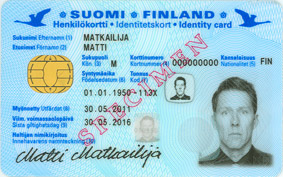
A smart card, chip card, or integrated circuit card is a physical electronic authorization device, used to control access to a resource. It is typically a plastic credit card-sized card with an embedded integrated circuit (IC) chip. Many smart cards include a pattern of metal contacts to electrically connect to the internal chip. Others are contactless, and some are both. Smart cards can provide personal identification, authentication, data storage, and application processing. Applications include identification, financial, mobile phones (SIM), public transit, computer security, schools, and healthcare. Smart cards may provide strong security authentication for single sign-on (SSO) within organizations. Numerous nations have deployed smart cards throughout their populations.

The Helsinki Metropolitan Area Council was a co-operation agency operating in the Helsinki Metropolitan Area, now replaced by HSL and HSY. The organisation had a few responsibilities, most notably regional public transport and waste management. It was subordinated to the city councils of the four participating cities. Furthermore, transport cooperation also included neighboring municipalities of Kerava and Kirkkonummi.

Near-Field Communication (NFC) is a set of communication protocols for communication between two electronic devices over a distance of 4 cm or less. NFC offers a low-speed connection with simple setup that can be used to bootstrap more-capable wireless connections.

A ticket machine, also known as a ticket vending machine (TVM), is a vending machine that produces paper or electronic tickets, or recharges a stored-value card or smart card or the user's mobile wallet, typically on a smartphone. For instance, ticket machines dispense train tickets at railway stations, transit tickets at metro stations and tram tickets at some tram stops and in some trams. Token machines may dispense the ticket in the form of a token which has the same function as a paper or electronic ticket. The typical transaction consists of a user using the display interface to select the type and quantity of tickets and then choosing a payment method of either cash, credit/debit card or smartcard. The ticket(s) are then printed on paper and dispensed to the user, or loaded onto the user's smartcard or smartphone.
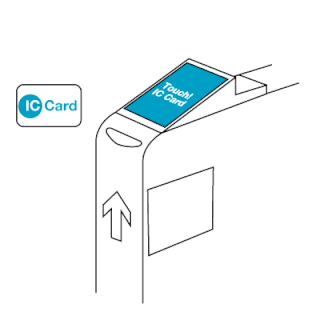
The EZ-Link card is a rechargeable contactless smart card and electronic money system that is primarily used as a payment method for public transport such as bus and rail lines in Singapore. A standard EZ-Link card is a credit-card-sized stored-value contact-less smart-card that comes in a variety of colours, as well as limited edition designs. It is sold by TransitLink Pte Ltd, a subsidiary of the Land Transport Authority (LTA), and can be used on travel modes across Singapore, including the Mass Rapid Transit (MRT), the Light Rapid Transit (LRT), public buses which are operated by SBS Transit, SMRT Buses, Tower Transit Singapore and Go-Ahead Singapore, as well as the Sentosa Express.

An electronic ticket is a method of ticket entry, processing, and marketing for companies in the airline, railways and other transport and entertainment industries.
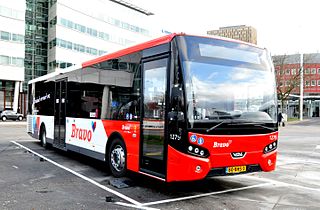
A transit bus is a type of bus used on shorter-distance public transport bus services. Several configurations are used, including low-floor buses, high-floor buses, double-decker buses, articulated buses and midibuses.
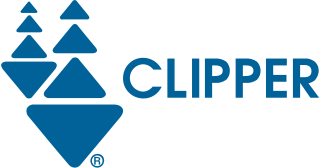
The Clipper card is a reloadable contactless smart card used for automated fare collection in the San Francisco Bay Area. First introduced as TransLink in 2002 by the Metropolitan Transportation Commission (MTC) as a pilot program, it was rebranded in its current form on June 16, 2010. Like other transit smart cards such as the Oyster card, the Clipper card is a credit card-sized stored-value card capable of holding both cash value and transit passes for the participating transit agencies. In addition to the traditional plastic card, Clipper is available as a virtual card in Google Pay and Apple Wallet. Clipper is accepted by nearly all public transit services in the Bay Area, including Muni, BART, Caltrain, AC Transit, SamTrans, Golden Gate Transit, Golden Gate Ferry, San Francisco Bay Ferry, VTA, and many others.

Because the rail operators are government-assisted profit-based corporations, fares and ticketing on Singapore's Mass Rapid Transit (MRT) system are currently aimed at least in breaking even to at least compensate for their costs of running the system. The rail operators collect fares by selling electronic tickets capable of storing data, the price of which is calculated based on the distance between the start and destination stations. These prices increase in fixed stages for standard non-concessionary travel. From the information that was earlier written in these tickets, it is possible to increase the fare according to increments based on approximate distances between stations.
The London Underground metro system of London, England uses a mix of paper and electronic smart-card ticketing.

İDO Istanbul Fast Ferries Co. Inc. was founded in 1987 by the Istanbul Metropolitan Municipality. Originally established with a fleet of 10 seabuses built by the Kvaerner Fjellstrand shipyard of Norway, the İDO today has a fleet of 25 seabuses designed by Kvaerner Fjellstrand, Austal and the Damen Group; 10 high-speed car ferries designed by Austal and the Damen Group; 18 car ferries; 32 commuter ferries; and 1 large passenger ship. At present, the İDO is the world's largest commuter ferry operator with its 87-passenger ships and 86 piers. The company owns a total of 103 ships including its service vessels.
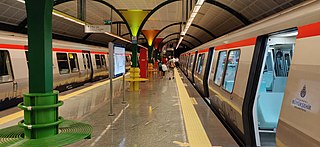
The Istanbul Metro is a rapid transit railway network that serves the city of Istanbul, Turkey. It is operated by Metro Istanbul, a company, a public enterprise, controlled by the Istanbul Metropolitan Municipality. The oldest section of the metro is the M1 line, which opened in 1989; it now includes 107 stations in service, with 104 more under construction.

Myki is a reloadable credit card-sized contactless smart card ticketing system used for electronic payment of fares on most public transport services in Melbourne and regional Victoria, Australia. Myki replaced the Metcard ticketing system and became fully operational at the end of 2012.
A fare is the fee paid by a passenger for use of a public transport system: rail, bus, taxi, etc. In the case of air transport, the term airfare is often used. Fare structure is the system set up to determine how much is to be paid by various passengers using a transit vehicle at any given time. A linked trip is a trip from the origin to the destination on the transit system. Even if a passenger must make several transfers during a journey, the trip is counted as one linked trip on the system.

Opal is a contactless fare collection system for public transport services in the greater Sydney area and most other urban areas of New South Wales, Australia. Operation of the Opal system is managed by the New South Wales Government's transport authority, Transport for NSW. First launched in late 2012, Opal is valid on Transport for NSW's metro, train, bus, ferry and light rail services that operate in Sydney and the neighbouring Central Coast, Hunter Region, Blue Mountains, Illawarra and Southern Highlands areas. Opal equipment was designed from the start to support a variety of cards, but launched with the captive Opal cards.
CIPURSE is an open security standard for transit fare collection systems. It makes use of smart card technologies and additional security measures.
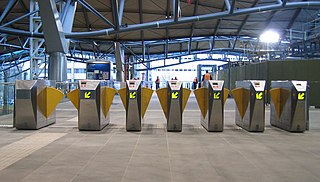
An automated fare collection (AFC) system is the collection of components that automate the ticketing system of a public transportation network - an automated version of manual fare collection. An AFC system is usually the basis for integrated ticketing.
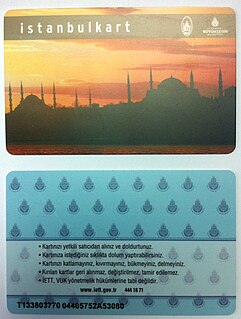
istanbulkart is a contactless smart card for fare payment on public transport in Istanbul, Turkey. It was introduced on March 23, 2009 in addition to, and to eventually replace, the Akbil, an integrated electronic ticket system. The card was developed and put into practice by the information technology company Belbim of the Metropolitan Municipality.

Ventra is an electronic fare payment system for the Chicago Transit Authority (CTA), Metra, and Pace, which replaced the Chicago Card and the Transit Card automated fare collection systems. Ventra launched in August 2013, with a full system transition occurring in July 2014. The payment system includes several options of payment, including a contactless smart card powered by RFID, a single day or use ticket powered by RFID, any personal bank-issued credit card or debit card that has an RFID chip, and a compatible mobile phone. Ventra is operated by Cubic Transportation Systems. A smartphone app allows users to manage fares, buy passes, and buy mobile tickets for Metra.
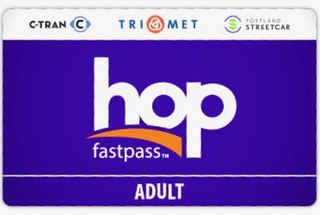
Hop Fastpass is a contactless smart card for public transit fare payment on most transit modes in the Portland, Oregon, metropolitan area including MAX Light Rail, WES commuter rail, Portland Streetcar, The Vine, and all TriMet and C-TRAN buses. An initial release to the general public began on July 5, 2017, with the official launch on July 17. The program is managed by TriMet.

















